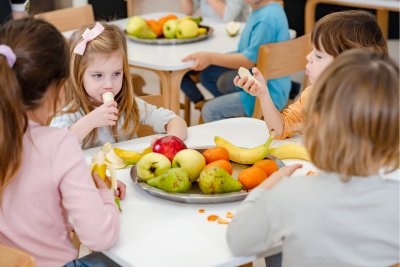 Copyright: AnnaStills | iStock.
Copyright: AnnaStills | iStock.

Parents welcome focus on food education in curriculum review but call for further action
The independent review, chaired by Becky Francis CBE, proposes to rename cookery in curriculum to "Food and Nutrition". But parents say recognition alone isn’t enough as children still need guaranteed time, resources and skills to learn meaningful food education.
Food and nutrition education has been given renewed attention in the Curriculum and Assessment Review: Building a World-Class Curriculum for All, led by Becky Francis. The report helpfully highlights the importance of children gaining practical cooking skills and an understanding of healthy eating and food systems. Campaigners say this recognition is an encouraging step, while emphasising that more detail, resourcing and commitment will be needed to ensure consistent, meaningful food education for all pupils.
Another positive outcome from the curriculum review is a clear recommendation for children to learn about climate change, nature and sustainability from primary school onwards. The report says that it is crucial for pupils to be "empowered with the necessary knowledge and skills to thrive in tomorrow’s industries and tackle the serious challenges facing our planet." The report recommends strengthening climate change and biodiversity education within science and geography, and embedding sustainability into the Design and Technology curriculum, where food and nutrition also sits.
Children's Food Campaign Officer, Naema Jannath says:
"We welcome the review’s recognition that children need meaningful food education. However, without dedicated time, trained staff, proper kitchen facilities and clear progression pathways, food education will continue to be inconsistent.
"We still believe Food & Nutrition should be treated as a standalone subject so that every child leaves school confident to cook healthy meals and understand where their food comes from.
"It's also encouraging to see the greater emphasis on climate and nature learning, and it offers a real chance to join up teaching about sustainability and food, but this will only have impact if food education is also properly supported and embedded across the whole school experience".
At present, cooking and nutrition is taught as part of Design and Technology at primary and lower secondary level, often alongside units such as textiles or product design. However, the review highlights concerns that this arrangement has left food education with “limited visibility and inconsistent delivery,” with schools varying widely in how much time and emphasis is given to it.
The review argues that food and nutrition has a distinct role in teaching essential life skills, understanding healthy diets, and exploring where food comes from and how it is produced. It recommends updating the curriculum so that the subject has its own clearly defined aims, rather than being treated simply as a practical strand of Design and Technology.
What the review proposes for Food & Nutrition:
- Renaming the subject to “Food & Nutrition” to better reflect its life-skills, health and wider food-system dimensions.
- Including clearer detail in the curriculum to ensure specific expectations are set for every key stage, so that food education is not treated as optional or peripheral.
- Reviewing Level 3 vocational pathways, particularly in food science and related subjects, to support progression to further study and careers in nutrition, food technology and the wider food industry.
- Wider within the Design & Technology and GCSE recommendations, embedding a greater understanding of sustainability in relation to materials, design and production processes.
Earlier this year, Children’s Food Campaign parent ambassadors submitted key recommendations and an open letter, urging policymakers to place food education at the heart of an updated curriculum.
Children's Food parent ambassador Mary Needham says:
“To me it is a no brainer that our children should leave school knowing how to put simple ingredients together to create a balanced meal. My experience, both as a parent and a practitioner, shows me that teaching kids how cook from scratch boosts their confidence, sparks their curiosity and equips them with other essential life skills such as budgeting, financial resilience and teamwork. As well as this, the sensory and social nature of cooking is beneficial for their mental well being, creativity and cognitive development."
Although the review’s direction is positive, several key recommendations from our parents have not yet been fully addressed:
- Food & Nutrition remains a sub-theme within Design & Technology rather than a standalone subject for Key Stages 1-3.
- The review does not recommend setting of specific practical skill benchmarks that parents would like to see, such as the number of healthy, nutritious meals pupils should be able to cook independently by the age of 16.
- The report recommends reviewing level 3 (post-16) education pathways, but stops short of proposing a Food & Nutrition A-Level. Instead it suggests other vocational routes, such as the government's recent proposals to introduce V Levels.
- There are no guarantees of funding, teacher training, or inspection mechanisms, which campaigners argue are essential for equitable delivery.
- The review does not explicitly recognise the value of a whole-school approach to food and its contribution to food education, including establishing school food culture, gardening and growing opportunities, or farm visits and wider food-system learning opportunities.
Parent Ambassador Gemma McFarlane says:
"There were high hopes for improvements to food education in this long-awaited curriculum review. It was reported today that the former boss of John Lewis - Sir Charlie Mayfield - has warned about the increasing number of people out of work due to ill-health. Food education is such a tiny part of the curriculum, I'm pleased to read that the review recommends the food curriculum provides more of a focus on developing skills for life as this is becoming increasingly important for our young people to learn these crucial life skills to support them to lead full healthier lives."
Stephanie Slater MBE, Founder and CEO of School Food Matters, says:
“This review marks a welcome recognition of the value of food education in supporting children’s health and wellbeing. For years, we’ve seen first-hand how powerful food education can be in sparking students’ confidence and curiosity, inspiring healthier habits and a lifelong love for food. This is a positive step forward but we must now ensure that these recommendations lead to meaningful change in every classroom.”
The government is now expected to launch a school curriculum consultation, with a final draft curriculum to be published by spring 2027, with the aim of starting implementation in schools from September 2028.
Read our Parent Ambassador letter to the Curriculum Review Team
Read the full Curriculum Review report
Children's Food Campaign: Campaigning for policy changes so that all children can easily eat sustainable and healthy food.
Sustain
The Green House
244-254 Cambridge Heath Road
London E2 9DA
020 3559 6777
sustain@sustainweb.org
Sustain advocates food and agriculture policies and practices that enhance the health and welfare of people and animals, improve the working and living environment, promote equity and enrich society and culture.
© Sustain 2026
Registered charity (no. 1018643)
Data privacy & cookies
Icons by Icons8







